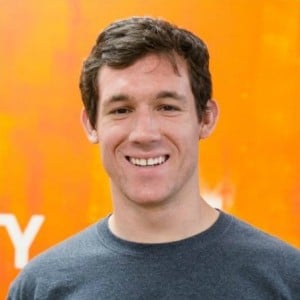Did you, unlike Udacity Course Developer Michael Wales, have no idea what you wanted to do while you were growing up? Maybe you dabbled in a few different areas of interest, spending various after-school evenings and weekends experimenting and boning up on a range of skills. Maybe you tried out a wide swath of classes in high school and courses in college, enjoying many but not finding yourself deeply certain yet what professional path to take. Maybe you did find yourself enchanted by a certain subject, but it wasn’t web development or even computer science.
 Consider the story of Cameron Pittman, another course developer at Udacity. Differently than Michael, Cameron found himself in the field of web development purely by accident. He said, “I was the Director of Content for another web startup and thought it was silly that I didn’t know how to code and didn’t understand the platform on which my product was being built. So I taught myself how to use Python. Then I started solving problems at work with code. Then I started working on the site. Then I officially became a software engineer full-time.” He sums up, “It’s been an incredible ride.”
Consider the story of Cameron Pittman, another course developer at Udacity. Differently than Michael, Cameron found himself in the field of web development purely by accident. He said, “I was the Director of Content for another web startup and thought it was silly that I didn’t know how to code and didn’t understand the platform on which my product was being built. So I taught myself how to use Python. Then I started solving problems at work with code. Then I started working on the site. Then I officially became a software engineer full-time.” He sums up, “It’s been an incredible ride.”
Cameron learned to program using MIT OpenCourseWare and the book Think Python. Codecademy gave him his first introduction to JavaScript. “But most of my starting knowledge came from just working with the engineers at my old company,” he said. Nowadays, Cameron looks to similar resources as Michael for general web troubleshooting and documentation, and also reads the design articles that regularly show up on Medium and A List Apart, as well as newsletters like Hacker Newsletter and A Drip of JS. He still advocates a figure-it-out-yourself approach, like the one he took to get into the field in the first place: “My favorite way to learn a new technology is to give myself a small project to build with it. I’ll read documentation, go through whatever tutorials I can find, refer to StackOverflow constantly, and just start hacking something together.”
Pre-programming, Cameron was actually a science teacher in Nashville, teaching astronomy, physics, and chemistry to public and charter school high schoolers. His undergraduate major was in physics with honors in astronomy, which he bolstered with an M.A. in teaching. But his path led from high school science classroom to Internet startup when he left teaching to help build e-learning platform LearnBIG, where he could apply his education credentials in an exciting, envelope-pushing environment.
“..I constantly get to make creative choices and build cool things.”
From there, as you’ve heard, he found his interest in coding sparked. At LearnBIG, Cameron went from managing the startup’s content to designing and developing new digital front-end features and interfaces, in addition to analyzing and maintaining LearnBIG’s back end of more than 16,000 learning resources. Notice, again, the proof of how web developers are not held back by a lack of formal training. Moreover, if you do have formal training in what you think is an unrelated field, think again. Cameron’s perhaps untraditional background in physical science, he said, “certainly helped me develop the kind of problem-solving techniques that are necessary for web development and programming in general.”
At Udacity, Cameron works alongside his fellow course developers to produce the acclaimed courses that help students embark on a path towards becoming professional web developers. What makes him happiest about the job? “It just so happens that the things I want to do are all of the things I get paid to do,” he said. “Every day is different and I constantly get to make creative choices and build cool things. Oh, and of course there’s the possibility that literally billions of people can easily consume the websites you create. No big deal.”
The Takeaway
No matter what you studied in high school or college, you can parlay that knowledge into a bona fide career as a web developer. You just have to be a self-starter and swallow any fear or doubt about exploring something tangential. Worried you’ll be at a disadvantage compared to people who’ve been coding since they could type, constantly having to play catch-up? Rest assured, the continuation of learning in a fast-paced, constantly changing industry like web development holds for developers across the board, not just those starting out or those with fewer years of experience. “I love to learn, and the field of web development is so large and growing so quickly that no one could ever learn everything,” said Cameron. “For me, that’s an exciting prospect.”
Stay tuned for Part Three of the series.


